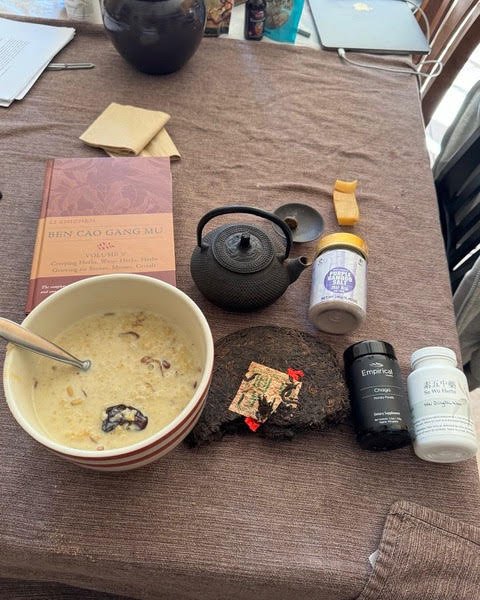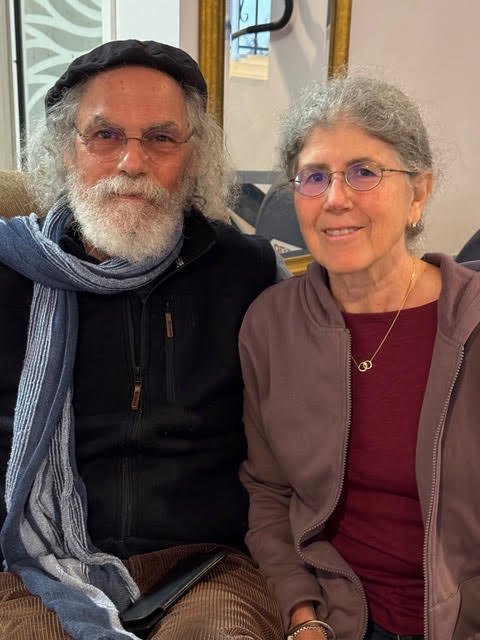Congee to the Rescue
What follows is a guest article by Z’ev Rosenberg, who is a one of the oldest, wisest, most experienced Western practitioners of classically oriented Chinese medicine in the US. Those of you who listen to my podcast or attend my Imperial Tutor live events will be familiar with his work since he and I love to explore intellectual intersections like those between ancient texts and modern practice, translation and application, yangsheng and alchemy, books and needles, etc etc…..
With the present post, he has finally gotten around to writing up his special recipe for his personal secret to longevity: His daily morning congee habit, which he has been following for as long as I have known him, I believe. Many of you have asked for it and waited for it since we released two podcast conversations:
“True Medicine of Yangsheng”: Episode Two of the Pebble in the Cosmic Pond podcast that was released on May 19, followed by “Pink Floyd, Yijing, and Macrobiotics” as the Imperial Tutorial of that month for the members of my Imperial Tutor mentorship.
“Food as Medicine”: Episode Four of the Pebble in the Cosmic Pond, released on July 18, followed by “Supplementing Essence by Means of Flavor” as the Imperial Tutorial.
So here we are, finally, just in time for the holiday season when our stomach Qi may be in need of some extra TLC. For more on Z’ev’s teachings and writings, visit his WEBSITE AT ZEVROSENBERG.COM. For recommendations by Z’ev on some of the ingredients that he mentions in the article, just click on any hyperlinked words. The other sources he is keeping secret or intentionally vague (such as “Korean bamboo salt on Amazon”) so as to ensure his continued personal supply. Without further ado, here is Z’ev’s article:
Congee 粥 zhōu and Chinese Medicine
A Foundational Principle of Health
“… to nourish life and seek peace and joy is not a matter lying deeply buried or far away and therefore difficult to know. It is situated between sleeping and eating. Hence this book was written to urge people to eat congee every day, and not laugh at it. ”
Poring through Volume V of Paul Unschuld’s translation of 本草綱目 Ben Cao Gang Mu (Creeping Herbs, Water Herbs, Herbs Growing on Stones, Mosses, Cereals), there is a section on congees with additions for medicinal effect. For several years now, I’ve had congee every single morning to begin my day. In my opinion, it is the foundation of a healthy diet, a direct application of what has been taught as ‘macrobiotics’, and a counterweight to all the ‘carb fear’ that permeates our modern culture. Bear with me, and I’ll post a recipe at the end of this article!
Li Shizhen states:
“Congees made with non-glutinous rice and millet have weakly pronounced qi and a bland flavor.” Quoting Zhang Lei in his Zhou ji, ‘every morning when you get up, eat one big bowl of congee, on an empty abdomen with depleted stomach qi (in other words, after sleeping, with no food residues in the stomach). The qi of the cereal will be quite active, and they offer not a small supplementation.’ [Congees] stimulate the movement of stomach qi and generate body fluids … drive away the old, and let the new arrive. It frees the passage through the diaphragm and boosts the stomach [qi].”
Li Shizhen then describes several additions to congee and their beneficial effects, including red mung beans (dal), yi yi ren / Job’s tears, lotus seed, taro, daikon radish, carrot, soybean relish (I use miso paste), fu ling / poria cocos, song zi / pine seed kernels, ginger, sesame and hemp seeds, and various animal organs.
My own morning congee alternates between black rice (grown in Thailand), millet, and in wintertime, whole oats. I use a small crock pot at a low setting, and in the afternoon add 3/4 cup of whole grain, and about three times the amount of spring water. This will vary with season, temperature and humidity, which will effect the quality of the congee. To this I add a palm full of dried whole cordyceps mushroom (dong chong xia cao), a pinch of Korean Bamboo Salt 9x, and 2 or 3 hong zao / Fructus jujube ‘dates’. Cordyceps supplements kidney and lung qi, jujube supplements spleen qi and blood, and the Korean bamboo salt strengthens the kidney, as in its processing organic sulfur compounds are made bioavailable. I cook the congee overnight, and in the morning I add a small amount of ‘golden berries’, goji berries / gou qi zi, and pine kernels / song zi. According to the 本草綱目 Ben Cao Gang Mu, congee with pine kernels moistens heart and lung, and regulates the large intestine. They are also known as a longevity food to Taoist adepts. Goji berries in congee supplement essence and blood, and boost kidney qi. They are also known to benefit the eyesight. I then let this cook for a few more hours before eating. To the finished congee I add oat milk, and occasionally adzuki bean miso paste. I then consume the congee with either freshly roasted almonds (1/2 hour at 265 degrees) or pickled daikon radish. This meal lasts through the morning, and gives me ample qi for seeing patients or writing and teaching.
Along with this, my early morning routine includes qigong, yoga, and stationary bicycle. I also take extracts of medicinal mushrooms from Dragon Herbs, including cordyceps, lions mane, chaga, red reishi / lingzhi and purple reishi. Recently, as noted in my last post, I’ve also been taking ding zhi wan / settle the will pill (I recommend the ones produced by Su Wu Herbs) from Sun Simiao’s recipe during the day to supplement the kidneys, sharpen the mind, and calm the shen. And I like Empirical Herbs for their mushroom honey pills. The cake of tea in the picture is of course frim Brian Kirbis’s collection of PU-ERH from Theasophie. Several times a week I take a morning bath with dead sea bath salts, E/O aromatherapy bubble bath and Botanica Alchemica Chinese herb aromatherapy oils, and oil my sinuses and scalp, shampoo and oils from Aesop and Avicenna company.
I hope these suggestions are helpful. May you enjoy congee every single day and reap good health and peace of mind!
Z’ev Rosenberg
小雪 Xiaoxue
San Diego, CA

